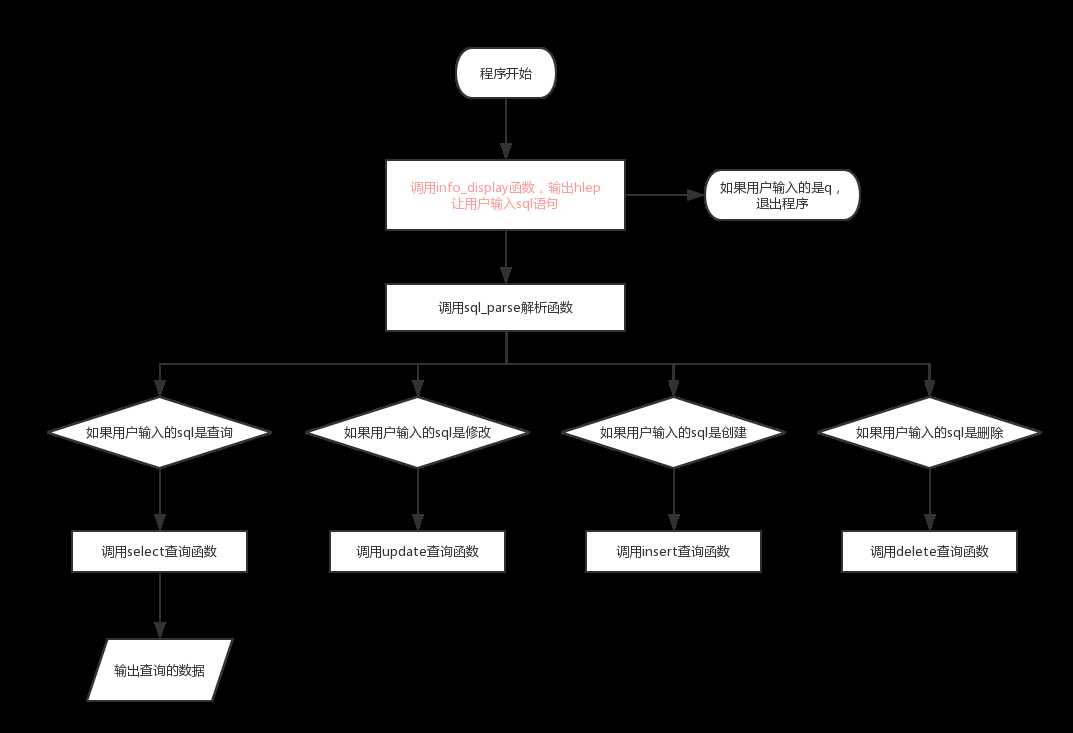标签:items display isp exce http last 帮助 taf exit
程序可实现以下功能:
1、查询,输入select name,age from staff_table where age > 22,查询到符合要求的信息;
输入select * from staff_table where dept = "IT",查询到符合要求的信息;
输入select * from staff_table where enroll_date like "2013",查询到符合要求的信息。
2、创建,输入insert Mickle,22,13651054608,IT,2013-04-01,加信息加入的员工信息表中。
3、删除,输入delect id,将指定的id号员工信息删除。
4、修改,输入update staff_table set dept = "Market" where dept = "IT",将要修改的内容修改。
程序还提供help功能,为用户输入正确的sql语句格式提供帮助。

import os #导入os模块,方便文件的删除和改名
def info_display(): #打印程序启动信息
print("-".center(60, "-"))
print("欢迎来到员工管理系统".center(50," "))
print("【输入help显示帮助信息】".center(50, " "))
print("-".center(60, "-"))
sql = input("请输入\033[1;31msql\033[0m信息>>>>").strip("")
if sql == "q" or sql == "quit": #用户如果输入q,程序退出
exit(" Bye Bye ".center(60, "-"))
elif sql == "help": #用户输入help,打印help信息,help信息为打印的格式
print("\033[1;35m 查询 输入格式:\n\tselect name,age from staff_table where age > 22\033[0m")
print("\033[1;35m 创建 输入格式:\n\tinsert Mickle,22,13651054608,IT,2013-04-01\033[0m")
print("\033[1;35m 修改 输入格式:\n\tupdate staff_table set dept = \"Market\" where dept = \"IT\"\033[0m")
print("\033[1;35m 删除 输入格式:\n\tdelete 5\033[0m")
else:
sql_parse(sql) #用户输入正确的sql语法,调用sql解析函数
def sql_parse(sql): #对用户输入的sql语句进行解析,根据sql语句调用不同的函数
func_choice = {"insert": insert, "delete": delete, "update": update, "select": select}
sql_list = sql.replace(",", " ").split() # 将sql解析成列表形式
if sql_list[0] == "select": #如果用户输入的sql语句是查询
sql_dict = {"from": [], "where": [], "limit": []}
tag = False
for item in sql_list: #根据sql解析出sql_dict
if tag and item in sql_dict:
tag = False
if not tag and item in sql_dict:
tag = True
key = item
continue
if tag:
sql_dict[key].append(item.strip(‘\"‘))
func_choice.get(sql_list[0])(sql_dict) #解析出sql_dict后,传入查询函数,并调用查询函数
elif sql_list[0] == "insert": #如果用户输入的sql语句是创建
sql_dict = {}
sql_list.remove("insert")
sql_dict.setdefault("values",sql_list) #解析出sql_dict,传入创建函数
insert(sql_dict) #调用创建函数
elif sql_list[0] == "delete": #解析出sql_dict后,传入删除函数,并调用查询函数
delete_id = int(sql_list[1]) #获取用户要删除的id
delete(delete_id) #调用删除函数
elif sql_list[0] == "update": #如果用户输入的sql语句是修改
sql_dict = {"set":[],"where":[],"update":[]}
tag = False
for items in sql_list: #根据用户的sql,解析出sql_dict字典
if tag and items in sql_dict:
tag = False
if not tag and items in sql_dict:
tag = True
key = items
continue
if tag:
sql_dict[key].append(items.strip(‘\"‘))
update(sql_dict) #传入修改函数,并调用修改函数
return sql_list
def insert(sql_dict): #创建信息函数
with open("staff_table","ab+") as f:
offs = -100
while True:
f.seek(offs,2)
lines = f.readlines()
if len(lines) > 1:
last = lines[-1]
break
offs *= 2
last = last.decode(encoding="utf-8")
last_id = int(last.split(",")[0])
new_id = last_id + 1
record = sql_dict.get("values")
record.insert(0,str(new_id))
record_str = ",".join(record)+"\n"
f.write(bytes(record_str,encoding="utf-8"))
f.flush()
print("\033[1;31m创建成功 \033[0m")
def delete(delete_id): #删除函数
with open("staff_table","r",encoding="utf-8") as f1,open("staff_table_bak","w",encoding=‘utf-8‘) as f2:
del_count = 1
for line in f1:
if del_count != delete_id:
f2.write(line)
elif del_count == delete_id:
pass
del_count += 1
print("\033[1;31m删除成功 \033[0m")
os.remove("staff_table") #删除原员工信息文件
os.rename("staff_table_bak","staff_table") #修改新员工信息文件名
def update(sql_dict): #修改函数
set_list = sql_dict.get("set") #获取要修改的内容
set_key = set_list[0]
where_list = sql_dict.get("where") #获取要修改的文件内容
with open("staff_table", "r", encoding="utf-8") as f1, open("staff_table_bak", "w", encoding=‘utf-8‘) as f2:
for line in f1:
title = "id,name,age,phone,dept,enroll_date"
dic = dict(zip(title.split(","),line.split(","))) #将文件每一行打包成字典的形式
if logic_action(dic,where_list): # 逻辑判断,调用逻辑判断函数
line = line.replace(dic[set_key],set_list[2]) #修改需要修改的那一行内容
f2.write(line) #将原文件写进新文件
print("\033[1;31m修改成功 \033[0m")
os.remove("staff_table")
os.rename("staff_table_bak", "staff_table")
def select(sql_dict): #查询函数
title = "id,name,age,phone,dept,enroll_date"
f = open("staff_table", "r", encoding="utf-8") # 1、找到数据库
res = []
for line in f:
dict1 = dict(zip(title.split(","), line.strip().split(",")))
where_list = sql_dict.get("where")
if len(where_list) != 0:
if logic_action(dict1, where_list): # 逻辑判断,调用逻辑判断函数
res.append(line.strip())
else:
res = f.readlines()
print("查询到的信息有 \033[1;35m %s \033[0m 条"%len(res))
for i in res:
print("分别是\033[1;35m [%s]\033[0m "%i)
return res
def logic_action(dict1, where_list): #逻辑判断函数,如果文件的信息符合要求,就返回True
tag = False
if where_list[1] == "<":
if dict1[where_list[0]] < where_list[2]:
tag = True
elif where_list[1] == "=":
if dict1[where_list[0]] == where_list[2]:
tag = True
else:pass
elif where_list[1] == ">":
if dict1[where_list[0]] > where_list[2]:
tag = True
else:pass
elif where_list[1] == "like":
if where_list[2] in dict1[where_list[0]]:
tag = True
return tag
while True:
try:
info_display()
except IndexError as e:
print("【%s】,请输入正确的格式"%e) #如果用户输入的格式不正确,就打印提示
标签:items display isp exce http last 帮助 taf exit
原文地址:http://www.cnblogs.com/japhi/p/6869585.html